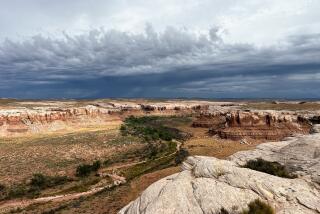Interior calls for 2-year freeze on mining claims near Grand Canyon
Interior Secretary Ken Salazar on Monday called for a two-year “timeout” on new mining claims on nearly 1 million acres near Grand Canyon National Park in northern Arizona.
The move reverses a decision by the George W. Bush administration to open the land flanking the park to hard-rock mining. That ruling, which opened the way for lucrative mining of uranium ore, was opposed by some in Congress and within the National Park Service over concerns about the toxic heavy metal’s potential effect on the park’s watershed, wildlife, and cultural and archaeological resources.
The Interior Department says it is placing a two-year hold on leasing of Forest Service and Bureau of Land Management land -- mostly on the north rim of the Grand Canyon and much of it within miles of the park -- while it studies the environmental effects of hard-rock exploration and mining.
The department could extend the mining ban for up to 20 years.
The land remains open to leasing for the mining of other minerals and for geothermal projects, according to a notice in Monday’s Federal Register.
National Mining Assn. spokesman Luke Popovich blasted the decision as a “de-facto ban on mining.”
“We can’t see how a sweeping ban for up to 20 years for all mining is justified,” he said. “Particularly when we are at a time when we are trying to strengthen our nation’s energy security.”
Increased interest in nuclear power has sent uranium prices soaring, sparking a rush of exploration.
Mining claims within five miles of the park increased to more than 1,100 last year, from 10 in 2003, according to government data reviewed by the Environmental Working Group.
Rep. Raul M. Grijalva (D-Ariz.), who co-sponsored legislation that would permanently prohibit uranium mining on federal land around the Grand Canyon, said: “This is a treasure that we cannot risk contaminating.”
Grand Canyon Supt. Steve Martin told The Times last year that he was concerned that uranium could get into the watershed and affect the fish in the Colorado River at the bottom of the gorge -- and the bald eagles, California condors and bighorn sheep that depend on the canyon’s seeps and springs.
Last year the Metropolitan Water District of Southern California, which sells wholesale water from its Colorado River Aqueduct, wrote to the Interior Department asking it to ban uranium mining near the Colorado River, arguing that “exploration and mining of radioactive material near a drinking water source may impact the public’s confidence in the safety and reliability of the water supply.”
--
More to Read
Sign up for Essential California
The most important California stories and recommendations in your inbox every morning.
You may occasionally receive promotional content from the Los Angeles Times.











